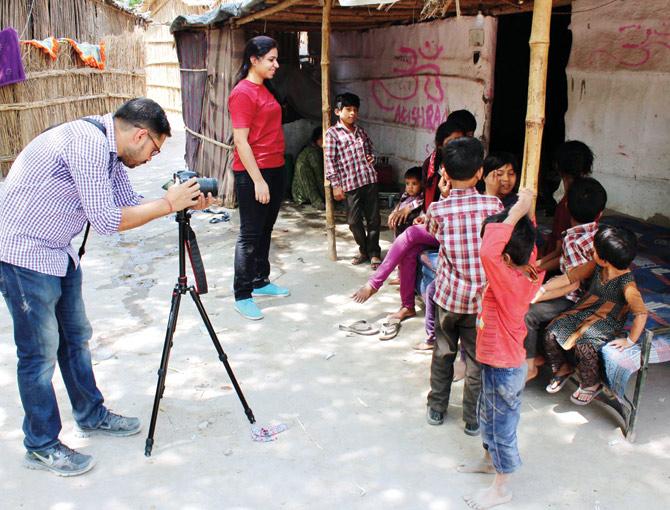Two young filmmakers beat the apathy shown towards Majnu Ka Tila-s Pakistani Hindu refugees with a new documentary

Hindus from Pakistan in Majnu ka Tila celebrated Holi, for perhaps the first time in their lives. Seen here, are filmmaker Prakash Jha (left, wearing spectacles) and Narma Dadi (in yellow), who fled Sindh and loves singing Bollywood numbers. PICs/P2P Prod
ADVERTISEMENT
New Delhi-s Majnu ka Tila was named after a crazed Sufi mystic who ferried people back and forth on the river Yamuna, free of cost. Guru Nanak, it is said, was moved by this man’s devotion, and stayed on in the area. Today, one of the oldest existing Sikh shrines is found here. But, Majnu ka Tila, like a fabled princess of the wondrous East, is referred to by many other names.
It is formally called New Aruna Nagar. The Tibetian refugees who arrived here in two waves — once in 1959 and again after the 1962 Sino-India War — loan it the sentiment of a motherland. For authentic Tibetian fare in the Capital, Mini Tibet is the place to go.

Hindus from Pakistan in Majnu ka Tila celebrated Holi, for perhaps the first time in their lives. Seen here, are filmmaker Prakash Jha left, wearing spectacles and Narma Dadi in yellow, who fled Sindh and loves singing Bollywood numbers. PICs/P2P Productions
Since 2011, Hindu families from Sindh, Pakistan, have sought refuge in this ramshackle shantytown. With their arrival, Majnu ka Tila could have technically become a cosmopolitan melting pot, but there is only so much that you can ask from a refugee settlement. It remains an unrecognised slum for invisible people, and two young filmmakers have taken it upon themselves to throw light on the lives of Pakistani Hindu refugees here.

Filmmakers Prakash Jha and Anuradha Mishra are documenting the lives of Pakistani Hindu refugees
Prakash Jha, a 26-year-old filmmaker, says that at Majnu ka Tila, the buzzword is -Pakistan-. And, when combined with -Hindu-, the identity is exotic, problematic, and almost unbelievable. Many a voyeur comes here to observe this seeming paradox and to ascertain what a Hindu from Pakistan is like. "People come here to gawk and talk to them, but few offer actual help," he says.
Along with his associate Anuradha Mishra, 24, Jha has been meeting the 3,000-odd Hindus from Pakistan who now live in Majnu ka Tila, and the neighbouring settlements of Adarsh Nagar and Rohini Camp. Their visits started in September 2015, and their observations boiled down to an oft-heard bottom-line.
"Governments and politicians may be helping them, but we are not able to see any change at the ground-level," says Jha, who hails from Munger, Bihar.
The stories they heard of the refugees, they decided, needed to be recorded and their plight made known. Mishra speaks of families who arrived on pilgrimages to the Kumbh, and found it an escape from their struggles back home. But the grass has not been greener. Necessities, basics and rights are at stake for the Pakistani refugees.
Education and jobs are hard to come by for those who have abandoned all property and ties to come here. Now, most of them peddle mobile phone covers, paan and chai, until they are busted by the police. Originally farmers, they cannot move out of the NCR without legal recognition, leave alone acquire farmlands. Children go to primary school, but the older 14+ lot cannot.
“The Constitution and the UNHCR don’t recognise them as refugees. We are hoping to move a change in this direction, so that those who were persecuted in the name of religion, can get a better life,” says Mishra. She recounts incidents they have shared with her, which range from the critical to the absurd. The abduction of school-going Hindu girls is as big a problem as when Pakistan loses a cricket match against India.
"They tell us that if India won, they were beaten up," says Mishra. Jha and Mishra aren’t too fussed about what to title their documentary. Instead of choosing poetic epithets to address the refugees- existence, the documentary is simply called, Who Am I? Pakistani or Indian?
For instance, Narma Dadi, a 75-year-old refugee from Sindh looks every bit Pakistani and sings a ’90s Bollywood number with great zeal. "Bollywood is loved by everyone, right?" says Jha. Last month, many of them in the camp celebrated Holi for the first time in their lives with the same elation that those in Maharashtra feel when they go to Goa and are able to order a prime beef stea.
One would think Majnu ka Tila is the ideal court for the Ghar Wapsi and Bharat Mata ki Jai camps. The filmmakers say that right-wing organisations had made promises of blankets ahead of winter, but it is now summer, and the offer is yet to materialise. Mishra and Jha are waiting for an Aam Aadmi Party representative to meet them. At this point, the two have resolved that any help from any quarters will have to do.
 Subscribe today by clicking the link and stay updated with the latest news!" Click here!
Subscribe today by clicking the link and stay updated with the latest news!" Click here!







